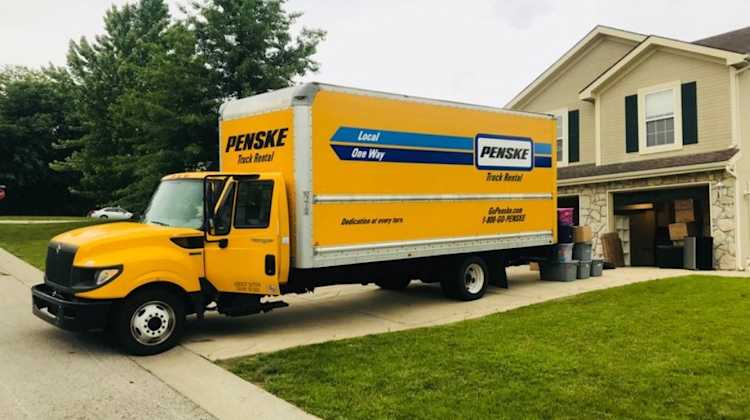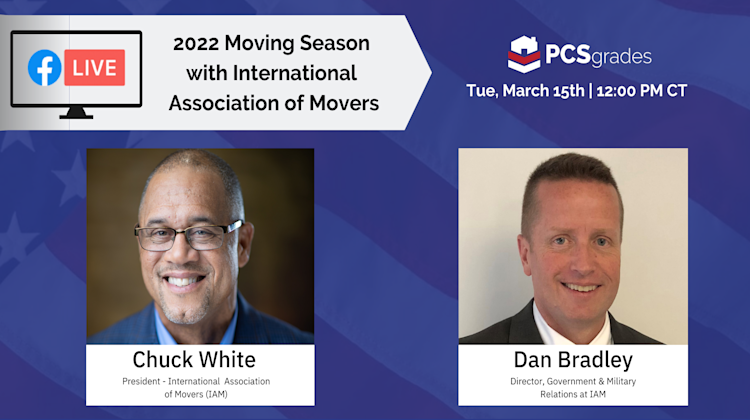Military Moving Industry, 2021 Updates from IAM
by Lizann Lightfoot - May 4th, 2021
IAM is the International Association of Movers. What do they do?
Chuck: We are a trade association. We represent companies involved in the moving industry– about 2,000 companies in 170 companies. We are focused on domestic and international moves. We are an advocate, a voice for the moving industry. We help transfer information from moving companies to TRANSCOM and the DoD and vice versa. So we are like the middle leg of the stool standing in between military families and the DoD.
Dan: I try to have solid relationships with our members to engage with shipping offices, the offices that ship Household Goods, etc, so I can communicate between TRANSCOM and our members and back. I try to engage in all those venues– it is general government, not just DoD. We handle Department of State and other agencies too. We want to bridge that gap.
How did Covid affect this PCS season?
Chuck: It affected industries all over the world, and the moving industry too. When people are hunkered down at home, they aren’t considering moving as much. We were dramatically impacted, and it couldn’t have come at a worse time. The moving industry is very seasonal. Typically people want to move in spring/summer in between school years, and that is typically the peak season. The DoD is about 20% of every move worldwide, so the Stop Move order nearly stopped the moving industry.
Dan: Yeah, the cash flow is usually highest during the summer, and it is a cash-dependent industry to hire people and prepare for next season. But right now cash flow is at its lowest for the year. There was no build up of cash flow until June, so for several months companies were just trying to stay afloat and hold onto some staff. Multiple Transportation Service Providers usually collaborate on a single family’s move: you may have one local company packing, another freight company storing, and a third company delivering. And overseas there are also port agents to containerize cargo and deliver. So when the military halts moves, it impacts many companies. Families need to understand that there isn’t just one company involved in your move. That’s why having a move coordinator is so important.
What should military families expect from PCS moves in 2021?
Chuck: We meet as an industry with US Transportation Command twice a week. We started having additional weekly calls to focus on COVID issues. One positive that has come from this is that we are asking those cutting orders to come in and participate in our calls. That didn’t happen before COVID, but now we have a better idea of how many orders have been cut, how many people are moving.
We are still about 60,000-70,000 moves under what we would typically do. We think we will still take another 2-3 months to catch up with all the moves that were put on hold. The capacity is there, the TSP hasn’t put blackouts in place. We have basically flattened the curve, we have the personnel there, and they are limiting how many there are in each week, so I think it will be a fairly smooth process moving forward, even though everything has shifted to the right. Some markets, like Hawaii, may be tough because there are a limited number of movers and companies there. There will be some places with location-specific issues. Transportation offices are all working remotely too, sometimes on the mainland in a different time zone. Focusing on communication and your move coordinator as a single point of contact is very important and can help alleviate those problems.
Dan: When we usually have a doubling of shipments during peak season, it usually has a big impact on the industry during a small window. Then it quickly shrinks back down and they don’t need as much personnel, warehouse space, trucks, etc. In non-peak season, customer satisfaction surveys go up because companies are handling your move better and families have less issues and a higher quality of move.
How do PCS moves look for the rest of the year?
Dan: On the health condition protocols of masks and wipe-downs, we may see that continue because we don’t have a solution for the pandemic yet. The 2021 rules don’t include those yet, but will probably be added in as needed. TRANSCOM and the services have done a good job putting the personnel and logistics folks together to project and communicate better. They tried to draw a line at about 9,000 shipments per week. Peak season can go up to 12,000 shipments, but that taxes everyone even when companies are fully up and running. They couldn’t jump straight to that peak number, so they eased into it and were pretty good about coordinating that. I hope there is more of an extended peak season next year to include May and September, which will allow a better quality move for the customer.
Chuck: We have been asking for more balanced numbers and smaller spikes for a long time. We have been saying that there are many single or childless military members that don’t need to evolve around the school year dates. We understand those needs for families with children, but it would be so helpful for those who don’t need those dates to move more on the fringes. The DoD told us that smoothing those numbers in the past was not possible, but we made it happen this year, so we hope it will continue more in the future.
Dan: A 2018 report said that 62% of military personnel have no kids. Of those who have kids, up to 40% are not of school age, so there are many people who can PCS not around school year dates. Of course, we understand that moving a single service member may require moving a family with kids to cover them.
How can military families help movers?
Chuck: This is about communication and relationships. I can understand the perspective of the moving crews who get hot and have trouble breathing when wearing masks, but it is our responsibility as an industry to do more educating and awareness of safety moving forward. What can you do? Call or email your Transportation Office and get a Quality Control officer out there. There have been numerous suspensions this summer for crews not being prepared and not wearing the correct gear. You can also call your Move Coordinator and let them know about the problem. It is a requirement and something we have to do as an industry, because this is life or death! I think people now have a better idea, but there are still some knuckleheads out there.
Dan: Also remember, an individual customer does not have the authority to tell a moving crew they don’t need to wear masks, even if you don’t care about masks. Because if a Quality Control person comes by there will be suspensions. They can take the masks off when they are outside, sitting in their truck, anywhere outside away from your property/belongings. Smoke break rules apply to mask break rules. But don’t try to tell them something you don’t have the authority to do.
What should you do when you can't reach your move coordinator?
They should be able to respond within 30 minutes. You can try to find your TSP’s 1-800 number and talk to the Customer Service department. You can also call your local transportation office, but remember that many of them are remote working, so sometimes email is faster. If you go on Move.mil and put in your zip code, you can get contact info for your regional office too. There is also a TRANSCOM hotline number listed on Move.mil Customer Service. They will document your complaint and contact the correct channels to address it.
What do military families need to know about hiring movers for a PPM?
Chuck: We are a trade organization and we vet the members of our organization. You can go to IAMovers.org website and click on the Mobility Exchange where we have a list of over 1,000 companies that are validated: proper insurance, licensure, etc. It is all documented there to show that they have the proper background, and you can search for movers by location. That was designed for a Business to Business relationship, but we are looking for a customer-based website where customers can look at an “IAM Trusted” mover designation to ensure they are dealing with a reputable company. If there are problems, IAM has an arbitration program where we can intervene on their behalf if there are issues.
Dan: If you want to Google “Protect your Move” it takes you to a website where you can enter the name of a company and find out if they are properly licensed in the US.
How should military families prep for moving day?
Chuck: You only need to have adults there, not the kids. You should prep your home properly and meet your crew at the door. The crew chief should introduce their crew to you. They should put down protective coverings on the floor so there won’t be damage. Then you should be accessible to them for questions. The more organized you are, the smoother the move will go. Have designated areas they can use (bathroom, etc) but clearly label any areas that are off limits or already empty/cleaned. Point out to the crew chief any items that are of particular interest. If there is a family heirloom or antique furniture, point it out to ensure that they take extra care of that piece. They want to know what is important to you so they can take extra care of it. Identify high-value items up front at the beginning of the day.
Dan: Not all crews are fully aware of DoD rules and regulations. If it is a small moving company doing a domestic move, they have a vested interest in making sure your move goes well. Build a relationship with the crew chief/driver to make sure you can discuss any specifics and handle things up front.
What do you expect from next year's Global Household Goods Contract (GHC)?
Dan: Our perspective on the GHC–We would argue that a lot of changes could have been made without turning the entire industry on its head. A lot of companies will go out of business, and things will change significantly. But most of those companies are already part of the program and are good solid companies that work hard and are competing to win the contract. I think that this will be a significant and abrupt change. There are ways to improve some of those issues, but TRANSCOM didn’t want to do a whole new study. Now there is nothing specific in the contract that suggests we will automatically get higher quality or more capacity. It is more of a hope.
Chuck: The contract is going to move from 900 Transportation Service Providers (direct contract to the US government) with a couple thousand agents who do the packing, loading, storing, etc. There are 3,000 companies who can be involved in this whole web. We are going from 350,000- 400,000 shipments, and we are giving all of it over to one company to manage. That is a dramatic change. Maybe it can work, but the growing pains associated with transitioning to one company is going to be very problematic and the problems are going to land on service member families.
Right now the contract has been awarded, but it is under protest (as is typical for large contracts like this). The Government Accountability Office has to rule on those by December 2. There will be another step in the legal process for further actions, but eventually it will be awarded and finally decided, but that may be a year or two down the road. It is currently scheduled to start in February of next year, and I don’t think that will happen because of the legal process. But families need to know that it will be a difficult and painful process. It is in a phased approach, so the time table now is going to shift to the right. The contract will start with US domestic moves first over a 4-month period. Then the international program will start months later with a similar transition. But the non-temporary storage does not transition under the new contract, so there will be multiple processes going on at the same time.
Dan: A lot of local agents will still have to remain in the program, but the TSP term will be gone. But you could have a move going on with a TSP who may not be in the program a few months down the road, so they have less incentive to get good reviews and do their best work.
What do you want to tell military families about the moving industry?
Chuck: I really do believe moves are one of the most stressful experiences in anyone’s life. Moving companies understand that, and they really are trying to do the best job that they can. You might get the first call from the Transportation Office and the crew chief and they are all doing great, but then there is that one person on the crew who is clogging the wheels and causing problems. Remember that the people coming into your home are usually trying to do the best job they can. The TSP companies usually want to resolve those problems in the best way possible. We would love to see more customer satisfaction surveys, but the ones we get have us at a strong success rate.
Dan: When I joined this side of the industry a few years ago, I was surprised how many people in the industry have military connections–personal experience or family relatives. They all want to do a good job for military families. You see and hear a lot of pride that people are very interested in moving military families. The DoD has a lot of rules and regulations that are difficult. It is easier to work with another corporate company, but a lot of companies do it because they have a personal connection and want to serve military families.
Find more info and details on the IAM website: Chuck and Dan both have email addresses listed on the website. If you have any concerns about an organization, we want to hear from you and will respond.
Our Guests:
Chuck White, President of the International Association of Movers. I am an Army brat whose Dad retired out of Ft. Belvoir, Virginia. I have been around DC for quite a while, and have worked in a moving company for 11 years and in the organization for 16 years.
Dan Bradley, I’m the Director of Government and Military Relations at the International Association of Movers. I did 20 years in the Air Force, and several years as a civilian employed by the Army, so I did about 10 PCS’s during my Air Force time, and had my wife and 4 military “brats” with me throughout that time.








